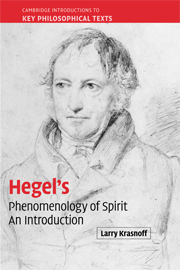7 - Practice
Published online by Cambridge University Press: 23 December 2009
Summary
In Hegel's skeptical argument against the purely theoretical standpoint, we learned that a subject cannot attain anything that would count as knowledge by ridding itself of its subjective character, by simply attending to objects in their purest and most unmediated form. We saw that actual theoretical knowledge is impossible without the transcendental conditions that characterize any knowing self: its conceptual, descriptive nature, and then its practical interest in explanation. But it is important to see that we came to understand the nature of the knowing self in a serial or developmental manner. By examining the efforts of the theoretical self as it attempts to shake off its own, subjective character, we came to learn just what that character is, and why it is essential to theoretical knowledge. We came to understand the nature of the subject only through the subject's own efforts to deny that nature.
Now, as we have seen, Hegel's task is to describe the nature of the active or practical self, since on his account it is this practical self that is essential to the successful knowing of the theoretical self. To complete his account of explanation, and thus of theoretical knowledge, Hegel must describe the character of the practical interests that (on his view) allow us to understand certain theoretical descriptions of the world as carrying explanatory power. So it would seem to follow that Hegel's account would plunge next into various accounts of the practice of explanation, of the practical interests that it serves.
- Type
- Chapter
- Information
- Hegel's 'Phenomenology of Spirit'An Introduction, pp. 93 - 112Publisher: Cambridge University PressPrint publication year: 2008

